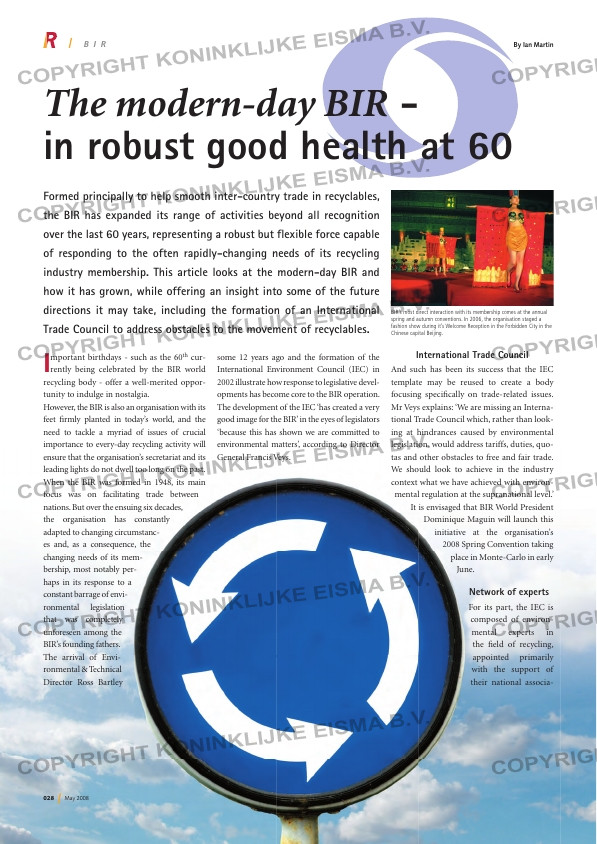Page 28 from: May 2008

B I R By Ian Martin
The modern-day BIR –
in robust good health at 60
Important birthdays – such as the 60
th cur-
rently being celebrated by the BIR world
recycling body – offer a well-merited oppor-
tunity to indulge in nostalgia.
However, the BIR is also an organisation with its
feet fi rmly planted in today’s world, and the
need to tackle a myriad of issues of crucial
importance to every-day recycling activity will
ensure that the organisation’s secretariat and its
leading lights do not dwell too long on the past.
When the BIR was formed in 1948, its main
focus was on facilitating trade between
nations. But over the ensuing six decades,
the organisation has constantly
adapted to changing circumstanc-
es and, as a consequence, the
changing needs of its mem-
bership, most notably per-
haps in its response to a
constant barrage of envi-
ronmental legislation
that was completely
unforeseen among the
BIR’s founding fathers.
The arrival of Envi-
ronmental & Technical
Director Ross Bartley
International Trade Council
And such has been its success that the IEC
template may be reused to create a body
focusing specifi cally on trade-related issues.
Mr Veys explains: ‘We are missing an Interna-
tional Trade Council which, rather than look-
ing at hindrances caused by environmental
legislation, would address tariffs, duties, quo-
tas and other obstacles to free and fair trade.
We should look to achieve in the industry
context what we have achieved with environ-
mental regulation at the supranational level.’
It is envisaged that BIR World President
Dominique Maguin will launch this
initiative at the organisation’s
2008 Spring Convention taking
place in Monte-Carlo in early
June.
Network of experts
For its part, the IEC is
composed of environ-
mental experts in
the fi eld of recycling,
appointed primarily
with the support of
their national associa-
028 May 2008
some 12 years ago and the formation of the
International Environment Council (IEC) in
2002 illustrate how response to legislative devel-
opments has become core to the BIR operation.
The development of the IEC ‘has created a very
good image for the BIR’ in the eyes of legislators
‘because this has shown we are committed to
environmental matters’, according to Director
General Francis Veys.
Formed principally to help smooth inter-country trade in recyclables,
the BIR has expanded its range of activities beyond all recognition
over the last 60 years, representing a robust but flexible force capable
of responding to the often rapidly-changing needs of its recycling
industry membership. This article looks at the modern-day BIR and
how it has grown, while offering an insight into some of the future
directions it may take, including the formation of an International
Trade Council to address obstacles to the movement of recyclables.
BIR’s most direct interaction with its membership comes at the annual
spring and autumn conventions. In 2006, the organisation staged a
fashion show during it’s Welcome Reception in the Forbidden City in the
Chinese capital Beijing.
RI_085_BIR.indd 2 14-05-2008 16:25:20



